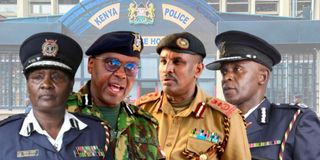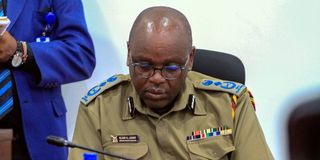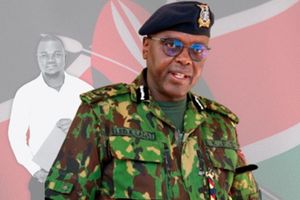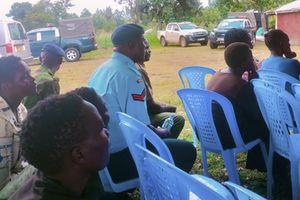
Former Deputy Inspector-General of Police Grace Kaindi, DIG Eliud Lagat, and former DIGs Noor Gabow and Joel Kitili.
The controversy surrounding the temporary exit of Deputy Inspector-General of Police Eliud Lagat has evoked memories of controversial tenures by his predecessors in the role created by the 2010 Constitution.
His stepping aside early this week to allow for investigations into the mysterious murder of teacher and blogger Albert Ojwang has rekindled memories of controversial and unhappy exits by those who came before him.
On Monday, June 16, DIG Lagat, who has been adversely mentioned in the murder, finally bowed to pressure and announced he had stepped aside, pending investigations into the death.
Ojwang, who died while in custody at the Nairobi Central Police Station, was arrested at his home in Kakoth village, Homa Bay County, on June 6 while having lunch with his wife, on claims that he had tarnished the name of DIG Lagat.

A photo of Voi-based teacher and blogger Albert Ojwang.
He was controversially ferried to Nairobi's Central Police Station, where he was murdered after being assaulted and strangled, according to an autopsy conducted on his remains.
His death triggered countrywide uproar, with human rights activists and leaders demanding answers about the murder from the top police leadership.
President Ruto named Eliud Lagat and Gilbert Masengeli as the DIGs—Kenya Police Service and Administration Police Service respectively—on July 25, 2024, replacing Mr Douglas Kanja, who became police boss, and Mr Noor Gabow, respectively.
Some of those who were previously at the helm of the much-coveted yet sensitive DIG position were either sacked or pushed out of office, never rising to become top cops.
Interestingly, none of the previous Deputy Inspectors-General of Police, except current Inspector General of Police Douglas Kanja, rose to become the country's police chief.
Mr Kanja previously served as the DIG Kenya Police Service, Commandant of the General Service Unit for five years, among other positions.

Deputy Inspector-General of Police Eliud Lagat.
Mr Lagat, who is just one rank away from becoming the country's top cop, seems to have suffered the jinx of his predecessors, even as he fights to clear his name.
"Mr Lagat is not the only one for whom the position has proved a mixed blessing. He seems to have suffered the jinx that has befallen his predecessors. Since the position was introduced after the 2010 Constitution, no DIG has risen to become Inspector-General of Police, except one—Douglas Kanja, the current IG. The rest were either hounded out of office or dropped before rising to the top," says Mr James Karani, a security analyst.
He added: "This looks like a case of history repeating itself. Whether Mr Lagat will survive the storm, unlike his predecessors, is a question of time."
Mr Lagat's rise to a decorated police chief was remarkable. With over 27 years in the police service, Lagat's career has been a masterclass in climbing the ranks, but his legacy now teeters on the edge.
Governance expert Dr Peter Mbae says most of the DIGs who ascended to the position after the promulgation of the 2010 Constitution left office unhappy, sacked, or controversially — like in the case of Grace Kaindi.
Previously, it was difficult for a woman to rise and become a top officer, but according to lawyer Steve Otieno, the 2010 Constitution paved the way for a woman to head the National Police Service.
"With the new Constitution, the National Police Service Commission that was charged with the responsibility of recruiting the first Inspector-General of Police and two deputies created room for a man or a woman to head the police," said Mr Otieno.

Former Deputy Inspector-General of Police Grace Kaindi.
The first-ever female Deputy Inspector-General of Police, Grace Kaindi, who was appointed on January 25, 2013, was hounded out of office on claims that she had attained her retirement age.
Ms Kaindi and Mr Samuel Arachi were the first DIGs to be appointed after the introduction of the 2010 Constitution that created the position.
Ms Kaindi was appointed as DIG Kenya Police Service and Mr Arachi became the DIG Administration Police.
However, after serving for two years, Ms Kaindi was removed by then-President Uhuru Kenyatta and appointed an ambassador.
The senior officer contested the retirement in court and argued that she would serve until 2018, when her term would end. She challenged her retirement from the National Police Service, which she termed as "forceful".
Ms Kaindi, however, withdrew the suit later in September 2015. Those close to her at the time said the claim that she had reached retirement age was a fallacy, since the commission had given her the go-ahead to stay in office until 2018, when her term as a state officer was to end.
Insiders claimed she was hounded out of office over controversial multi-million-shilling tenders for police equipment. The tenders included the purchase of police choppers, bulletproof vests, uniforms, and guns, amounting to Sh12 billion.
They claimed that operatives wanted her to sanction the purchase, but she apparently demanded that the law be followed.
Ms Kaindi's removal from office was criticised as unprocedural and unlawful. Her removal stirred controversy across the political and social divide, with the then opposition led by Orange Democratic Movement Party leader Raila Odinga accusing the government of employing unconstitutional and inhumane methods to eject her from office.
On September 1, 2015, after Ms Kaindi withdrew the court case, President Uhuru Kenyatta plucked Joel Mboya Kitili from the General Service Unit (GSU), where he was Commandant, to replace her as DIG Kenya Police.

Former Deputy Inspector-General of Police Joel Kitili.
Mr Kitili had also served in State House, where he was the Commandant of the Presidential Escort, and as the head of the National Armoury.
Ms Kaindi did not have a chance to rise to the top to become the Inspector-General of Police. But she is not the only one who suffered that fate.
On January 5, 2018, one year after the 2017 General Election, President Kenyatta abruptly dropped Mr Kitili and Mr Arachi as heads of the Kenya Police and Administration Police and replaced them with Edward Njoroge Mbugua and Noor Gabow.
In 2024, the redeployment of DIG Gabow to public service abruptly ended his career in the National Police Service and cut short his dream of becoming the top cop. He left the service about two years before he retired.
Mr Gabow was succeeded by Mr James Kamau, the immediate Commandant of the National Police Service Embakasi campus, who took over the position in an acting capacity.
The only DIG who served until his retirement from the National Police Service was Edward Mbugua. Mr Mbugua retired in March 2023, handing over to Abdalla Komesha (Acting DIG). In 2019, President Kenyatta extended his tenure to March 2023, when he retired.
According to lawyer Steve Kabita, the 2010 Constitution introduced fundamental changes in both the structure and command of the police.
"The 2010 Constitution established the National Police Service, which consists of the Kenya Police Service and the Administration Police Service, as part of the operationalisation of police reforms, as emphasised in the 2009 report by the National Task Force on Police Reforms in Kenya. The task force had highlighted some key recommendations for police reforms based on key pillars like restructuring of the two police services, decentralising the police services, and enhancing police transparency and accountability," he explained.
"Under the pillar of restructuring of the two police services, a significant reform effort involved the merger of the Kenya Police and the Administration Police to create a unified National Police Service (NPS). The office of the IGP (Inspector-General of Police) was created after the merging of the two policing units (Administration Police and Kenya Police) to coordinate and oversee the operations of the National Police Service. This merger aimed to streamline and improve law enforcement operations, enhance efficiency, and eliminate duplication of roles and resources," he added.
Mr Kabita said it was therefore necessary to create the two DIG positions to be in charge of the newly created police commands.
"The law required that all operations of the Administration Police and Kenya Police Service fall under the office of the Inspector-General of Police, who then delegates to two Deputy Inspectors-General in charge of the Administration Police and Kenya Police Service. A DIG should be of the rank of Assistant Inspector-General of Police and above," he said.
According to Kabita, the National Police Service Act stipulates that the mandate of the Deputy Inspector-General of Police is five years, renewable for another term. “But the renewal, unlike the initial appointment, is subject to consideration of the retirement age of 60 years,” he added.
According to long-serving provincial administrator Joseph Kaguthi, the two DIG offices were created to improve law enforcement operations, enhance efficiency, and eliminate duplication of roles and resources.
"The 2010 Constitution created the National Police Service, headed by the Inspector-General, who has two deputies—one in charge of the Kenya Police and the other in charge of the Administration Police—as a way of improving law enforcement operations," he said.
Section 20 of the National Police Service Act says that a vacancy in the DIG position only arises when the holder dies, resigns from office by notice in writing addressed to the President, or is removed from office in accordance with the Constitution or the NPS Act.
In a statement to the press, Lagat pledged to cooperate with the investigative agencies probing the matter. "I undertake to provide any support that may be required of me during investigations of the unfortunate incident," he said.
He has already appeared before the Independent Policing Oversight Authority (Ipoa) detectives and recorded his statement about Mr Ojwang’s death.
The role of the DIG–KPS involves commanding, controlling, and administering the Kenya Police Service under the direction of the IG. The role of the DIG–APS is responsible for leading the Administration Police Service and operates under the direction and control of the IG.
[email protected]









